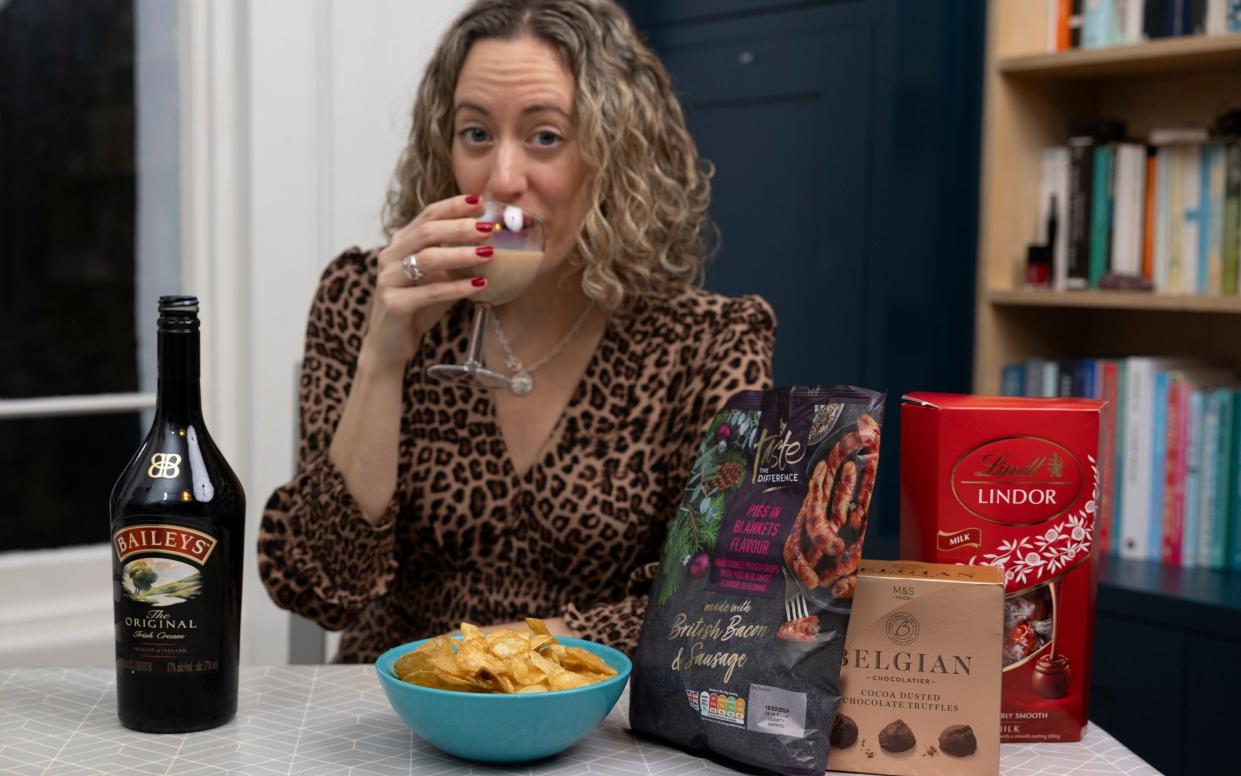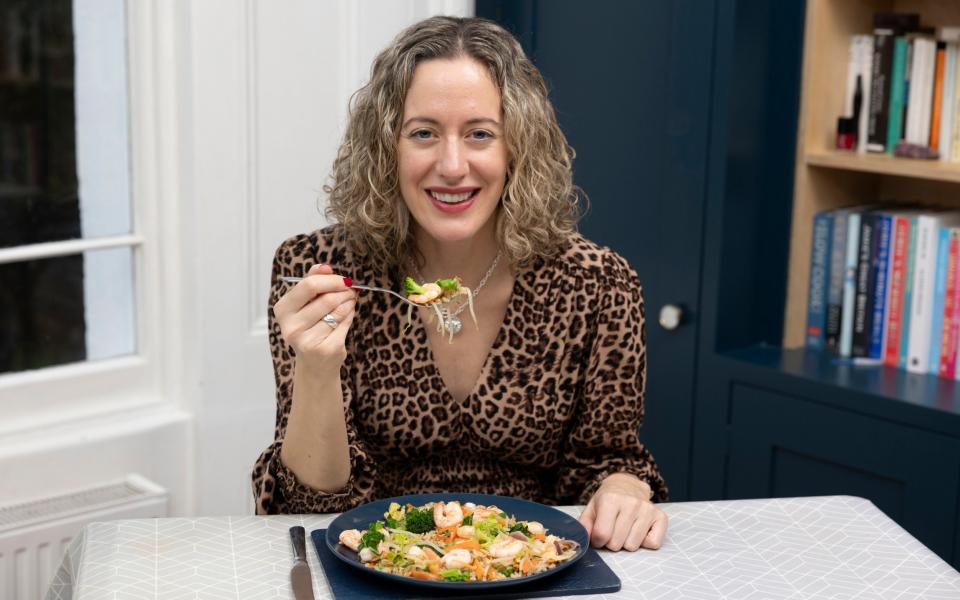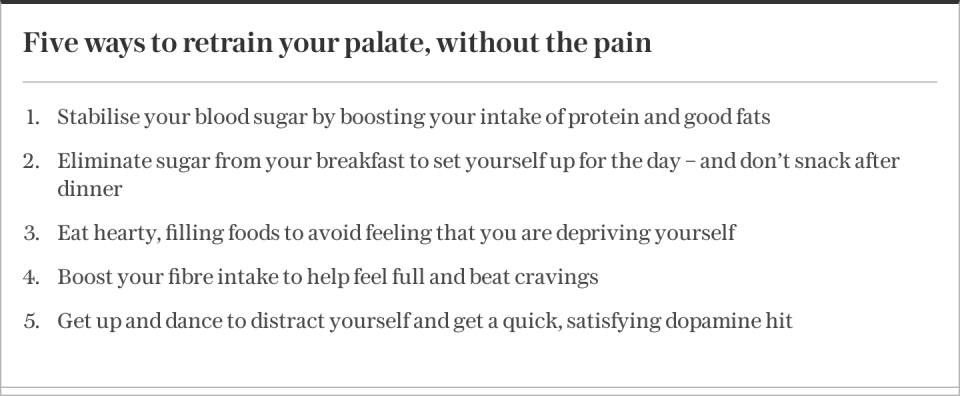How to retrain your palate after Christmas indulgence

If you’re anything like me, you’ll have spent the past fortnight eating in a way that would make Charlie and the Chocolate Factory’s gluttonous Augustus Gloop blush. A handful of Lindt chocolates before breakfast: why not? Baileys and crisps at 11am? Rude not to. Slabs of stilton and chunks of Christmas cake as snacks between massive meals? Oh, go on then.
Like me, you may also be feeling somewhat disgusting (and disgusted) by this point: bloated, spotty and nauseous, not to mention sick of riding the rollercoaster of sugar highs followed shortly after by enervating slumps. But at this point – half woman, half Terry’s Chocolate Orange – the idea of cutting out everything indulgent and returning to my normal, far more sensible, eating habits seems overwhelming, not to mention unappealing.
So, what’s the best way to reset our palates after the festive blow-out? Is it better to go cold turkey and force ourselves to munch salad until we get used to the idea that the Quality Street have truly gone, or is a more gradual, gentle approach more likely to reap rewards? And what can we do to help the process along?
Cold turkey
According to Dr Angela Mooney, a psychologist based in London specialising in health and compulsive behaviours, it’s unsurprising that it feels so difficult to impose restrictions on our food consumption after the festivities. “It only takes a couple of days to form a habit,’ she says, which explains why, once we’ve begun, it’s so easy to get used to eating whatever we want, whenever we want – and, by day three, finding it totally normal.”
For many people, Dr Mooney says that the Christmas period offers a reward at the end of a year in which we’ve been controlling our urges for unhealthy food “and suddenly, we can eat freely, without any consequences.” But when we do this, it can quickly feel addictive due to the chemicals our bodies release.
“Highly processed, sugary food such as chocolate gives us an immediate dopamine high,” she explains. “There’s also a release of serotonin, a mood-enhancer, and oxytocin, the feel-good chemical which gives us a sense of calm and is also released during other compulsive, addictive behaviours such as gambling and drug-taking.”

All of which makes gorging ourselves so pleasurable, but unfortunately it’s then followed by a dopamine comedown. “It can lead to low mood, which is where feelings of shame and disgust about what we’ve done can come into play,” she says – a feeling common to many of us over the festive period, which we often address by popping another chocolate into our mouths.
For most of us, a short period of overeating won’t lead to any long-term problems. And it doesn’t take long to “retrain” our sense of taste, either – our taste buds, essentially a group of taste receptor cells, regenerate every 10 days.
But once we’ve grown accustomed to the regular hits of dopamine, serotonin and oxytocin, quitting them often feels like a detox of sorts, accompanied by strong, unpleasant cravings. Is the way through them to throw out all any leftover cheese and confectionery, grit our teeth and wait for them to pass?
Laura Southern, nutritionist of London Food Therapy, argues that while getting most of the temptation out of the house is a good idea, launching ourselves into a traditional, low-calorie diet is not. “In January, when it’s cold and dark, what our bodies need isn’t green juices and salad, but nourishing, heating, rich foods that give us comfort,” she says.
Stabilise your blood sugar
The quickest way to get back to healthier eating habits and eliminate cravings is to try to stabilise our blood sugar. “If your blood sugar is spiking and then crashing, you’ll get strong signals that you need more sugar, which are hard to manage,” she says. She advises her clients to begin with eliminating sugar from breakfast and replacing it with protein and healthy fat: “Something like eggs and avocado on toast, or yoghurt and berries, which will ensure your blood sugar stays stable throughout the morning.” This will make resisting unhealthy snacks far easier – and the good news is that it doesn’t take long to kick in. “Our bodies respond very quickly when our blood sugar is stable,” she says.
For the first couple of weeks, she suggests focusing on the morning, and also trying to avoid snacking after dinner. “It’s so easy to sit in front of the TV in the evening and grab the Maltesers, but it’s the time of day when eating causes the most damage in terms of blood sugar, insulin sensitivity and weight gain,” she says. “Even if you continue to have a biscuit or chocolate bar in the afternoon, stabilising your blood sugar the rest of the time will help you to stick to just one.”
Dr Mooney agrees: “Complete abstinence isn’t ideal, as it can lead to a sense of deprivation, followed by more over-indulgence, and then guilt and bad feelings about ourselves, which make us more likely to binge again in a yo-yo cycle.”

Rather than thinking in terms of stripping foods out of our diets, Southern says it’s better to concentrate on trying to get more nourishing foods in. “Hearty homemade soups, stews, curries and stir-fries with warming spices, colourful vegetables and grains, [all] are ideal at this time of year,” she says. “They fill us up and fuel us from the inside, and they can be exciting for our taste buds.
“And if we can switch some of our white carbohydrates, which cause our blood sugar to rise quickly, to whole grains, such as brown rice instead of rice, that will help, too.”
Striving to eat more fibre is a resolution which is proven to help us stay satiated for longer, lessen cravings and retrain our taste buds. Boosting our vegetable intake is vital too – in fact, a 2019 study from Belgium found that just two weeks of eating more fibre-rich vegetables reduced people’s desire for sweet, salty and fatty foods. Sweet potatoes are full of fibre, and also help with cravings for sweet flavours. And a handful of nuts, which contains around 3g of fibre, is an excellent swap for less healthy snacks.
“By adding in all the nourishing foods, you’ll find that soon, you won’t want to eat what you were eating at Christmas – and if you do, it won’t taste as tempting,” says Southern. Ensuring you fill up on hearty dishes won’t only make the process easier from a physical perspective, but mentally, too. “If you’re depriving yourself too much, you’re more likely to fail and feel guilty, which usually leads to more of the behaviour you want to avoid,” says Dr Mooney.
Don’t join the gym!
Although healthier foods don’t give us the same “high” as processed ones, other activities can mimic the dopamine rush. Dalton Wong, a celebrity personal trainer and the founder of TwentyTwo Training, says that instead of rushing to join a gym, we can support our bodies to retrain our palates with simple activities which cost nothing.
‘Walking with purpose is an excellent way to stimulate your blood flow and get the endorphins going,’ he says. ‘Higher-intensity activities are also ideal for replacing the dopamine hit from sugary foods, but it doesn’t need to be a sprint, it could be a dance class, or you putting on some music that you love and dancing your heart out – that will immediately increase your heart rate and lift your mood.’
Exercise can also be a useful distraction when temptation strikes, and help reset our habits. “Doing a few stretches, or going for a walk, can take your mind off the craving until it passes,” he says.
Within a couple of weeks, it’s possible to find yourself craving soups and stews instead of chocolate. “My clients often say they can’t believe they’ll ever feel that way, but then they do,” says Southern. “And they haven’t felt they had to punish themselves to get there.”

